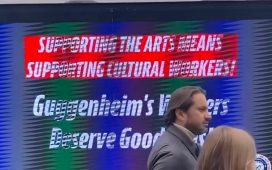Tuol Sleng Genocide Museum was formerly the Security Prison 21 used by the Khmer Rouge communist regime in Phnom Penh, Cambodia
© Flickr/nucksfan604
The Cambodian government has threatened legal action against the UK-based Vice media group after the culture publication ran an article containing manipulated portraits of the people killed at the hands of the Khmer Rouge at Phnom Penh’s Security Prison 21.
The modified images, by the Irish photographic artist Matt Loughrey, were taken without permission from the archive of what is today the Tuol Sleng Genocide Museum and ran on Vice’s website on 9 April.
As part of a wider project titled The Colourful Past, Loughrey restored and colourised the archival portraits of the prison’s victims in post-production. In some cases, he then edited the portraits to give the impression the inmates were smiling at the moment the photograph was taken. In one photo, Loughrey may have added a bloody handprint added to a wall behind the inmate, the Khmer Times newspaper reported.
In altering the images in such a way without first seeking permission, Loughrey may have broken laws in Cambodia’s 2005 Archives Act, said Cambodia’s Ministry of Culture and Fine Arts in a statement. The edited images “seriously affect the dignity of the victims…We urge researchers, artists and the public not to manipulate any historical source to respect the victims,” the ministry said.
Loughrey did not respond to a request for comment from The Art Newspaper.
Jailers in Security Prison 21 were known to take photographs of every prisoner as part of the detailed records maintained by the Khmer Rouge of the estimated 1.7 million people the regime killed between 1975 and 1979—nearly a quarter of Cambodia’s overall population at that time.
Many of the inmates at Tuol Sleng were tortured before being murdered in what are now known as the ‘killing fields’ of Choeung Ek.
A statement by the National Cambodian Heritage and Killing Fields Museum also criticised the project: “This was done without the consent of family members who lost loved ones in the prison, and with other Cambodian community organisations who are involved in this work… Minimising the pain and trauma of our community from those who are not connected to the experience is not only revising and erasing history, it’s a violent act. There is no celebration from these traumas.”
In a quote given to the journalist Eliza McPhail, Loughrey said in the now deleted Vice article: “Out of 100 images I looked at, the data showed that the women tended to have a smile on their face more so than the men. I think a lot of that has to do with nervousness. Also—and I’m making an educated guess—whoever was taking the photographs and who was present in the room might have spoken differently to the women than they did the men. I thought about this time and time again when I was working on them. We smile when we’re nervous. We smile when we have something to hide. One of the classic things is to try and be friendly with your captor.”
On Twitter, the Phnom Penh-based freelance journalist Quinn Libson shared a screengrab of an exchange she claims a Cambodian friend had with Loughrey on Instagram, which was shared with their permission.
Loughrey wrote the criticism of his work was “nonsense.”
“I am not falsifying history or anything of the sort—people are very quick to ‘call out’ others but the reality is something morally justifiable,” he responded. “I’ve worked with 142 (and counting) Cambodian families since late 2019 when this began and out of these 142 there are 11 that requested their relatives to smile and in some of those cases it was the only picture they had.”
Vice responded by deleting the article from its website. In a short statement, the organisation said: “We regret the error and will investigate how this failure of the editorial process occurred.” Vice did not respond to a request for comment.









